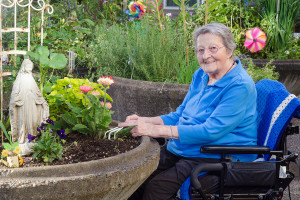Enjoying the outdoors during the summer and fall provides many benefits to seniors, and is worth a bit of extra time and planning for those experiencing mobility problems; but getting outdoors with limited mobility can be challenging. A main advantage of heading outdoors, even for a short period of time, is being able to soak up the sunlight, which generates Vitamin D, essential for the brain, bones and for muscle function. It also often gives seniors an opportunity to socialize with other people, children and animals. Additionally, experiencing a fresh breeze and being surrounded by nature—even if that is just your backyard garden—can be rejuvenating and offer a much-needed change for seniors who are often cooped up indoors for the majority of their time. How can you begin the process of getting your loved one outdoors? If he or she is resistant to the idea of going outside, you might need to look for ways to develop a desire for fresh air.
- Set up a window box or bird feeder outside a window and serve meals at the window.
- If you have the space, consider planting a small garden. Not only will it bring some nature close to home, but new seedlings are exciting to watch as they grow and change each day. With a garden in the yard, the elder doesn’t have to go far, and a reward awaits them—seeing the blooms.
- If your loved one is bedridden and getting outdoors is not an option, bring the outside in. A plant or vase of flowers on a nightstand can help.
- If your loved one’s home has a private patio or porch, he or she may feel more comfortable about being alone outside, without being in view of neighbors or strangers.
- Even going to the mailbox daily (either walking or in a wheelchair, if needed) can let the elder get a few minutes of fresh air. Routine is often comforting and this small daily task can do your loved one a world of good.
- Once the elder has become accustomed to getting outside, take it a step further. Suggest a short trip around the neighborhood or take them to a nearby park.
Although caregivers may be aware of the benefits, sometimes it seems as if the obstacles, such as wheelchair access, bathroom access, frailty and fatigue, are too great to overcome the great outdoors.
Caregivers can start to prepare elders with mobility problems to take the steps to head outside. Your physician can suggest chair exercises to make them more stable and build their muscles, for example.
Ensuring your loved ones’ safety while outdoors is key. If they are unstable when they walk, consider a cane or a walker. Or if your loved one is wheel-chair bound, consider a portable wheel-chair that you can get in and out of your car relatively easily. Dress your loved one appropriately for the weather. Being too hot or too cold will make the experience uncomfortable and discourage the elder from going out. Make sure they have a hat in the sun and bring water so that they stay well-hydrated.
It’s the perfect time of year to get your loved one outdoors. You may be surprised at what a difference it can make to their well-being—and yours.
By Caren Parnes
For the Senior’s Choice
Read More: 7 Top Activities for the Blind Elderly in California

Enjoying the Outdoors





